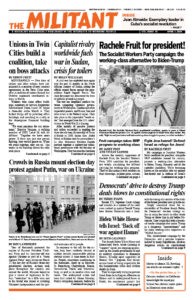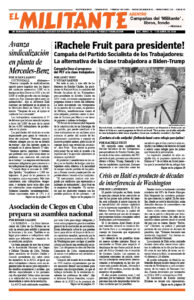NEW YORK— “The tremendous advances for women in Cuba have their roots in the revolution that triumphed on Jan. 1, 1959,” Osmayda Hernández said at a March 16 meeting here. Hernández, a member of the national leadership of the Federation of Cuban Women (FMC), was part of Cuba’s delegation to the 68th session of the U.N. Commission on the Status of Women.
She was speaking at a “Teach-in on Cuba” held at New York University’s Law School, attended by some 70 people from the U.S. and Canada. It was an opportunity to hear directly from representatives of the FMC and other members of the Cuban women’s delegation. The event was also livestreamed.
Two panel discussions were followed by a public rally that evening demanding Washington remove Cuba from its “State Sponsors of Terrorism” list, return Guantánamo to Cuba, and lift all U.S. economic and travel sanctions against Cuba. It featured Yuri Gala, Cuba’s deputy permanent representative to the U.N., and Aylen Lesmes of the Cuban Institute for Friendship with the Peoples (ICAP).
Hernández described how women, along with working people as a whole, have made major advances through Cuba’s socialist revolution, eliminating illiteracy, gaining free, universal access to health care, the right to abortion and paid maternity leave. And, in contrast with the U.S. and other capitalist countries, women have a government that defends their interests.
The FMC, formed in 1960 at Fidel Castro’s initiative, has helped “integrate Cuban women into all aspects of life — economic, political, and cultural,” she said. Today women play a leading role in Cuba’s government, trade unions and scientific and educational institutions.
The U.S. ruling families hate the example the Cuban Revolution has set for millions around the world. They’ve waged a relentless economic war for more than 65 years to try to strangle the Cuban people — sanctions the Biden administration continues to enforce.
“There is not a single woman, not a single family in Cuba, that doesn’t feel the impact of the U.S. blockade,” Hernández said.
Yamila González Ferrer, vice president of the National Union of Cuban Jurists, noted that “today we have problems even getting condoms and other contraceptives.”
Leima Martínez, ICAP’s director for North America, explained that by maintaining Cuba on its outrageous “State Sponsors of Terrorism” list, Washington penalizes international institutions that trade with Cuba, largely blocking its access to the world banking and credit system. “This means we often can’t import needed raw materials and fuel.”
The panelists addressed other social questions that affect women. “Because of the embargo, we lack resources to build new child care centers. The ones we have cover only 19% of the demand,” Hernández said. So the FMC and the Central Organization of Cuban Workers, she explained, have worked with government ministries to set up child care facilities, known as casitas infantiles (children’s homes), in some state-run workplaces.
“These centers serve not only the families of those workers but the surrounding community,” she noted.
To help bridge the gap, there are child care workers who offer private services in their homes. “But we do everything possible so children can receive their education and care in child care centers.”
“Cuba’s aging population means we need to train more people to care for the elderly,” said Juanita Martínez of the National Union of Cuban Jurists.
“The damage caused by the U.S. blockade has cost Cuba $4.8 billion a year,” Ambassador Gala told the evening rally. “But we have demonstrated our will to resist and move forward in face of these obstacles. The Cuban Revolution has dignified Cuba and the Cuban people. And we will defend it to the last drop of our blood.”

